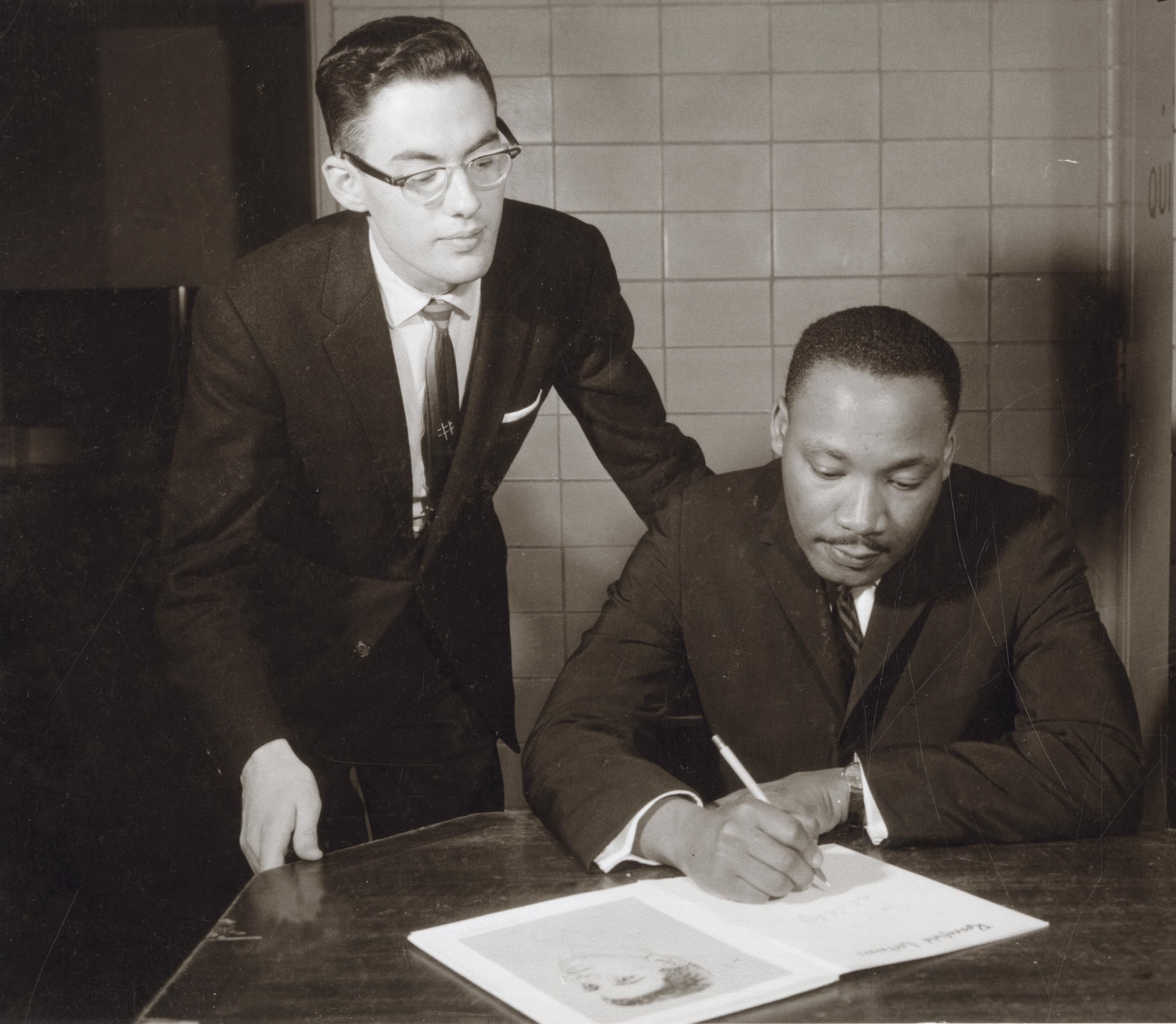Happy New Year from the Public History Project! This month's newsletter includes an introduction to one of the Public History Project's student researchers, links to upcoming events, new book and podcast recommendations, an MLK Day archival treasure, and more!
The University of Wisconsin-Madison’s Public History Project is a multi-year effort to uncover and give voice to those who experienced, challenged, and overcame prejudice on campus. As always, if you have a story to share, an event you think should be researched, or a person you think has been overlooked, please email us at publichistoryproject@wisc.edu.
|
|
|
|
|
|
Tomorrow, Thursday, January 25th at 6:30 pm, this year’s MLK Symposium will feature Hannah Nikole-Jones, Pulitzer Prize-winning creator of The 1619 Project, staff writer at The New York Times Magazine, and co-founder of the Ida B. Wells Society for Investigative Reporting. Hannah-Jones will reflect on the legacy of Dr. Martin Luther King, Jr., through the lens of her award-winning work investigating racial injustice and the consequences of slavery in American history. For more information, visit this link.
|
|
|
|

|
Martin Luther King, Jr. with a student. King spoke at the Union Theater on March 31, 1962. Courtesy of UW Archives.
|
We get asked a lot of questions. Every month we'll share an answer to a question we received.
Question: How many times did Martin Luther King, Jr. visit UW-Madison?
Answer: Twice!
Martin Luther King Jr. made two visits to UW-Madison - once in 1962 to speak at the Wisconsin Union Theater and again in 1965 to speak at the Stock Pavilion. The Project’s researchers were struck by a quote from his 1965 visit.
“We can take direct action against injustice without waiting for other agencies to act. We will not obey unjust laws or submit to unjust practices. We will do this peacefully, openly, and cheerfully because our aim is to persuade... We will try to persuade with our words but if our words fail, we will persuade with our actions. We will always be willing to talk and seek fair compromise, but we are ready to suffer when necessary and even risk our lives to become witnesses to the truth as we see it.”
Got a question? Send us an email at publichistoryproject@wisc.edu
|
|
|
|
The crowd of attendees at the Martin Luther King, Jr. Memorial on April 5, 1968. Courtesy of UW Archives.
|
|
|
|
To celebrate Martin Luther King Jr. Day, this month we’re highlighting a special audio archival object. As the country reeled following the assassination of Martin Luther King Jr. on April 4, 1968, Black students saw an opportunity to push the campus community to seriously reckon with racial discrimination. The scheduled memorial for King was originally planned by the University administration. Black students fought to have control over the memorial. They organized an event that began with speeches, given entirely by Black students, and was followed by a silent march to the State Capitol. The speeches were emotional and raw, filled with impassioned calls for white students and faculty to help join the fight for social justice. Less than a year later, the 1969 Black Strike would begin. You can listen to parts of the speeches here.
|
|
|
|
Introducing Kayla Rose Parker, one of the Project's History Corp researchers. Kayla is a senior studying history and political science at UW-Madison. She has been with the Public History Project since the summer of 2021 researching the history of Black Greek-letter Organizations on UW-Madison’s campus. Kayla’s research interests include the campus history of student protest and action, as directed by the Public History Project and UW-Madison’s Nonviolence Project. Academically, Kayla focuses on slavery in the United States and the Caribbean from its onset in the 1490s to its end in the 1880s. Kayla is currently researching the intellectual use of Nat Turner, leader of an 1831 slave insurrection, by abolitionists and proslavery advocates at the onset of the American Civil War for her senior history thesis. Following graduation, Kayla will be taking a break to brush up on her Spanish before pursuing a Ph.D. in history.
|
|
|
|
Stay tuned for a new blog post from the Public History Project being released this Thursday, January 27th to mark International Holocaust Remembrance Day.
Looking for something to read in the meantime? Check out the 18 blog posts we've published since the Project began here.
|
|
|
|
Each month, we want to share one of the many (many… many… ) books the Project has used for our research. This month, we highlight the work of local historian Stu Levitan, Madison in the Sixties. In this first-ever comprehensive narrative of the 1960s in Madison -- accounts of everything from politics to public schools, construction to crime, and more-- Madison historian Stuart D. Levitan chronicles the birth of modern Madison.
|
|
|
|
Each month the Project's Director, Kacie Lucchini Butcher will share a book, podcast, movie, quote, or something else she thinks has been adding to the PHP. We're calling it "From The Desk of KLB"
This month From The Desk of KLB - The podcast The Memory Palace. The Memory Palace is a storytelling podcast, telling short, surprising stories of the past - sometimes heartbreaking, sometimes hysterical, often a little bit of both.
|
|
|
|
As always, if you have a story to share, an event you think should be researched, or a person you think has been overlooked, please email us at publichistoryproject@wisc.edu.
|
|
|
|
|